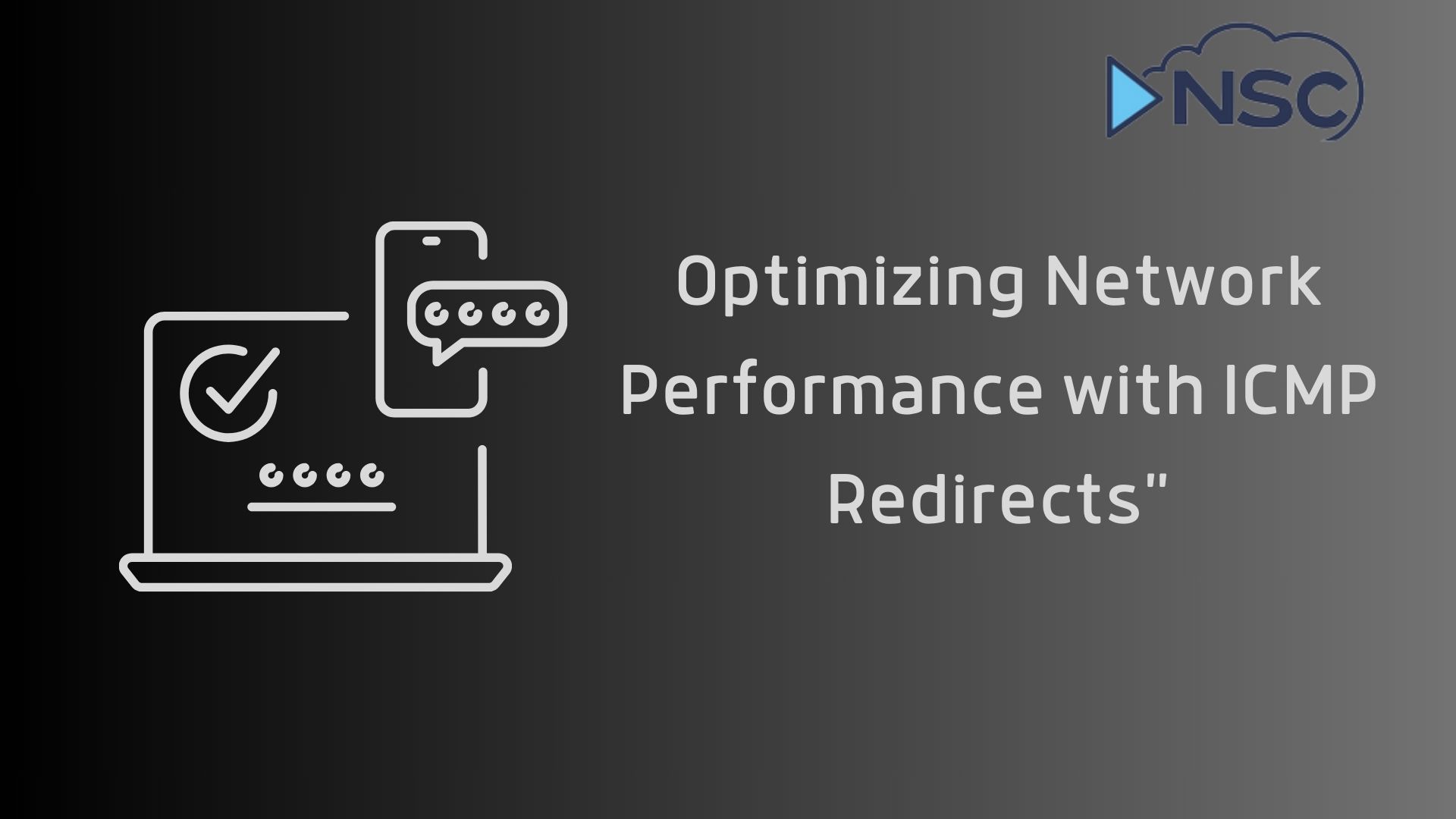In the complex world of network management, efficiency and security are paramount. One of the tools at the disposal of network engineers to enhance these aspects is the Internet Control Message Protocol (ICMP) redirect. This mechanism is crucial for optimizing routing decisions, which in turn can significantly improve the efficiency of network traffic flow.
However, the technical aspects surrounding ICMP, especially concerning an empty ICMP redirect cache, carry important implications for both network performance and security.
This blog delves into the significance of ICMP redirects, explaining their operation, the impact of an empty redirect cache, and the associated security considerations.
By understanding these elements, network administrators can better manage and secure their networks, ensuring optimal performance and robust security.
What Are ICMP Redirects?
Internet Control Message Protocol (ICMP) redirects are notifications sent by routers to hosts, indicating a more efficient route for sending packets. Originally designed to optimize routing in dynamic network environments, ICMP redirects help conserve network bandwidth and reduce latency by informing hosts of a better path to their destination.
How ICMP Redirects Work
When a host sends a packet through a router, and the router knows of a shorter or better route through another router, it sends an ICMP redirect message back to the host. This message includes the address of the better router. Following this, the host adjusts its routing table to send future packets to this new router directly, bypassing the initial longer route.
- Example: If a host sends a packet via Router A, but Router A knows that Router B has a direct route to the destination, Router A will send an ICMP redirect message to the host. This ensures that subsequent packets are sent directly to Router B, optimizing the routing process.
Real-world Examples of ICMP Usage
In practice, ICMP redirects are particularly useful in complex networks where multiple routers manage traffic. They help in scenarios where network topology changes frequently or where temporary routing efficiencies can be gained. For instance, in corporate networks with redundant paths designed for failover purposes, ICMP redirects can dynamically guide traffic along the optimal path, enhancing overall network performance.
Importance of ICMP Redirects in Routing
ICMP redirects play a critical role in enhancing the efficiency of network routing. By enabling more direct routing paths, they not only improve the speed of data transmission but also contribute significantly to the overall network performance.
Efficiency Gains from Using ICMP Redirects
The primary benefit of ICMP redirects is the reduction of unnecessary network hops, which decreases latency and packet loss. This is particularly beneficial in large networks where data packets must travel across multiple routers. By directing traffic through the shortest available path, ICMP redirects optimize the use of network resources, ensuring faster and more reliable communication.
- Impact on Network Traffic and Bandwidth Usage: Efficient routing facilitated by ICMP redirects helps in managing network traffic more effectively. It reduces congestion on busy routers and frees up bandwidth for other critical communications. This is crucial for maintaining high performance in networks that handle large volumes of data.
Strategic Advantages in Network Management
Implementing ICMP redirects allows network administrators to dynamically manage routing policies without the need for manual reconfiguration. This adaptability is crucial for maintaining network performance in response to real-time changes and challenges.
- Example: During a network upgrade or maintenance, ICMP redirects can temporarily reroute traffic to prevent downtime and ensure continuous service availability.

The Empty ICMP Redirect Cache
Understanding the implications of an "ICMP redirect cache is empty" message is vital for network administrators, as it can significantly impact both performance and security.
Understanding the ICMP Redirect Cache
The ICMP redirect cache is a part of the host’s memory used to store information about better routes suggested by routers through ICMP redirect messages. When this cache is empty, it indicates that no redirects have been stored, which could mean several things:
- New or reset network: The cache may be empty because the network is new or has recently been reset.
- Lack of redirect messages: No better routes have been suggested by routers, possibly due to static routing configurations or isolated network segments.
Implications on Network Performance and Security
An empty ICMP redirect cache might lead to suboptimal routing decisions, as hosts continue to use longer or less efficient paths that have not been updated with potentially better routes suggested by ICMP redirects.
- Security Concerns: An empty cache can also be indicative of security measures or configurations that block ICMP messages to prevent potential attacks, such as spoofing or redirection exploits. While this can enhance security, it may compromise routing efficiency.
Best Practices for Managing ICMP Redirect Cache
To ensure optimal performance and security, network administrators should:
- Monitor ICMP activities: Regularly check the status of ICMP redirect caches and logs to ensure that routing updates are received and applied.
- Adjust security settings: Balance the blocking of ICMP messages with the need for efficient routing. Utilize firewall rules and intrusion detection systems to selectively allow safe ICMP traffic.
Security Concerns with ICMP Redirects
While ICMP redirects are instrumental in optimizing network routing, they also introduce specific vulnerabilities that can be exploited by malicious actors. Understanding these security concerns is crucial for safeguarding network integrity.
Vulnerabilities Associated with ICMP Redirects
ICMP redirects, by design, allow routers to suggest alternative routing paths. However, this feature can be exploited to reroute network traffic maliciously. If an attacker gains control over a router or can spoof ICMP redirect messages, they could potentially redirect traffic to compromised machines.
- Spoofing Attacks: An attacker sends fake ICMP redirect messages to a host, tricking it into sending traffic through a malicious router.
- Redirection Attacks: Traffic is deliberately rerouted to facilitate eavesdropping or data interception.
Common Attacks Exploiting ICMP Redirects
Several well-known attacks leverage the vulnerabilities associated with ICMP redirects:
- Man-in-the-Middle (MitM) Attacks: By sending spoofed ICMP redirect packets, an attacker can insert themselves between two communicating hosts to intercept or manipulate data.
- Denial of Service (DoS) Attacks: Overloading a network with spurious ICMP redirect messages can lead to network congestion, disrupting regular traffic.
Best Practices for Securing Networks Against ICMP Redirect Attacks
To protect networks from the security risks posed by ICMP redirects, administrators should adopt the following best practices:
- Implement strict filtering rules for ICMP messages: Configure firewalls and routers to accept ICMP redirects only from trusted devices.
- Regularly update and patch network devices: Keeping firmware and software up-to-date ensures that known vulnerabilities related to ICMP redirects are addressed.
- Network monitoring and anomaly detection: Use network monitoring tools to detect unusual ICMP traffic that could indicate an ongoing attack.
Implementing and Managing ICMP Redirects
Effective implementation and management of ICMP redirects are critical for maintaining optimal network performance and security. Here are some guidelines and tools that can help network administrators manage ICMP redirect settings efficiently.
Guidelines for Configuring ICMP Redirects
Configuring ICMP redirects involves setting up routers and hosts to handle ICMP messages appropriately. Here are some key steps:
- Router Configuration: Ensure that routers are configured to send ICMP redirect messages only when absolutely necessary. This should align with the overall routing policy of the network.
- Host Configuration: Hosts should be set to accept ICMP redirects only from trusted routers. This can typically be managed through network settings or operating system configurations.
Tools and Commands for Managing ICMP Redirects
Several tools and commands can assist in the management of ICMP redirects, including:
- Network Diagnostic Tools: Tools like traceroute and ping can help verify the paths chosen by packets and identify whether ICMP redirects are effectively optimizing the routing.
- Router Management Software: Advanced router management software often provides options to monitor and control ICMP redirect behavior, ensuring that redirects contribute positively to network performance.
Monitoring and Maintaining ICMP Redirect Settings
Regular monitoring is essential to ensure that ICMP redirects are functioning as intended and not causing unintended security risks:
- Regular Audits: Conduct periodic audits of network traffic and ICMP redirect logs to ensure that all redirects are valid and secure.
- Update Security Protocols: Continuously evaluate and update security protocols to address emerging threats that may exploit ICMP redirects.
Summary
ICMP redirects are essential for optimizing network routing and enhancing performance. Properly managing these redirects increases efficiency and ensures network security. However, it's critical to implement security measures to protect against vulnerabilities associated with ICMP redirects.
For a deeper dive into network security, especially with Cisco technologies, consider exploring our Cisco ASA Firewall 9.x course. This course provides valuable insights into managing network functions and security configurations effectively.
By staying vigilant and proactive in network management, administrators can maximize the benefits of ICMP redirects while safeguarding their networks.


